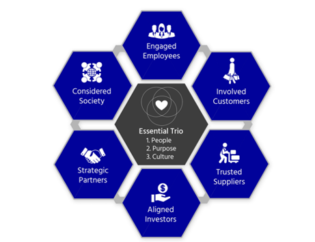
And finally, closing the Integrated Stakeholder Ecosystem (ISE) today, we will look at the last but still crucial stakeholder group, the society. What does a “considered society” really mean?
Well,…in short, companies are more and more taking responsibility for what is kind of “outside of their job description”. Before, the government, supported by variety of NPO organizations, had almost a sole responsibility to make sure businesses stick to the rules of the game, paying sanctions in case they didn’t. So what has changed?
First, the trend gave rise to the famous Corporate Social Responsibility (CSR), blamed by many as a “brand-washing” exercise, but later, many companies understood they do actually have a greater responsibility going beyond producing and delivering a specific product or service. They started to realize and take accountability for how their products/services are produced or what footprint their production is having on the environment.
Moreover, the customers became more aware, conscious about and sensitive to the overall company behavior including their societal impact made (if positive or negative). Even if a company was to offer the most unique product at the most competitive price, but did harm to the environment or did engage in child labor “on the way”, the willingness to purchase their product and “support” such behavior of many would decrease. Additionally, such pull-back could be seen across the whole stakeholder ecosystem, if from employees (talent), investors, suppliers or partners.
So what strategies are becoming more common by companies today in order to consider the society and contribute towards a greater societal impact?
#1 Companies actually encourage and support its employees to volunteer or get involved with charities/foundations of their choice as research proves that being involved in a volunteer program can be very fulfilling and boost employee productivity, engagement and overall work-motivation. Some even allow their staff to dedicate specific amount of their paid hours each year to volunteering.
#2 Some run in-house volunteer programs and hold volunteer-appreciation awards in order to celebrate and encourage volunteering, pro-bono work or donations. This helps in in-house community and tribe building above the engagement and satisfaction their people experience.
#3 Many are involved in ecological, environmental and fair-trade activities, being pro-active in making their production and overall business practices sustainable, incorporating innovation in order to enhance existing methods.
#4 Some also cooperate with the governments, which usually have limited capacity and resources to make an impact all alone, to address local or global issues.
So think for a moment: What is your company doing in regards to caring for the greater society? What strategies have you seen working well, enabling organizations to make an impact on the society?






